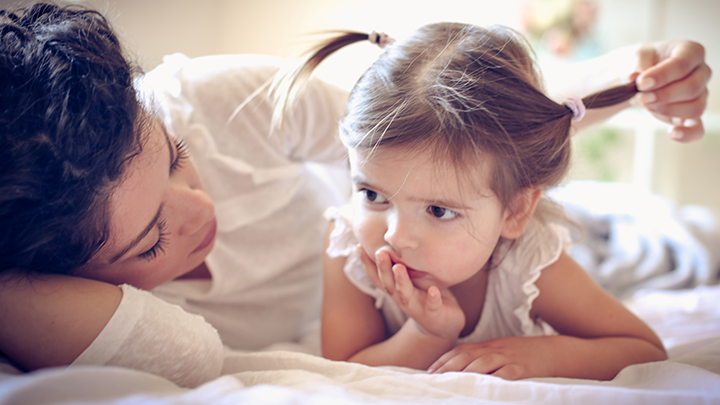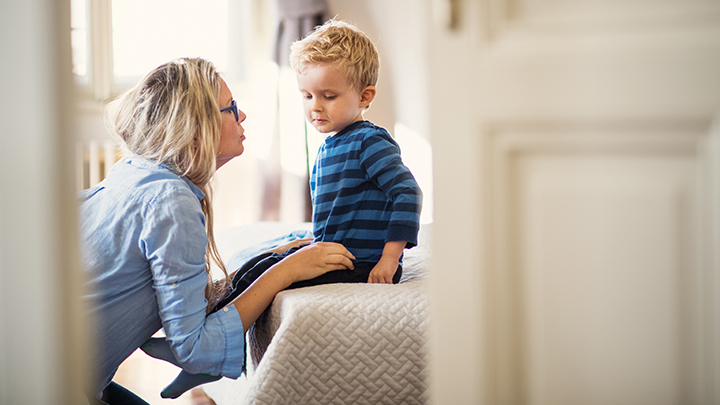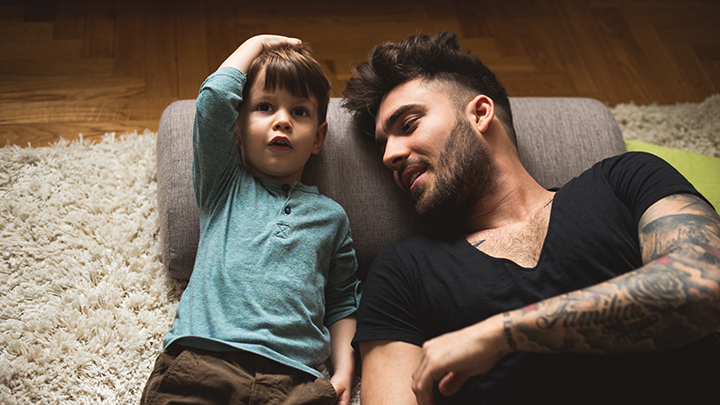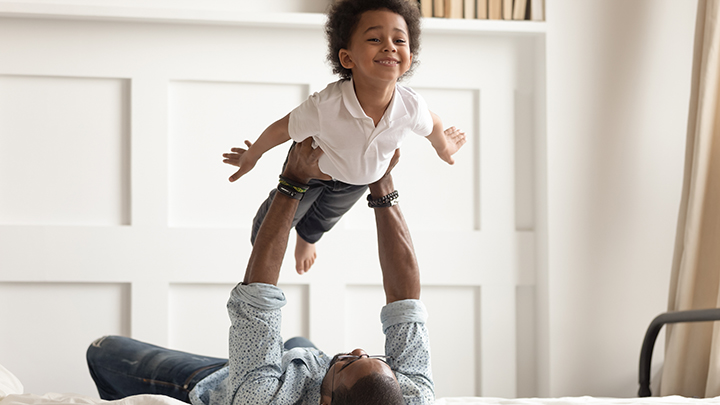
April 22, 2020

As parents, our instinct is to shield and protect our children. But talking with them about trying times can help relieve their worries.
Building resilience — the ability to bounce back from setbacks and cope with life’s ups and downs — gives you and your children a well of reassuring and positive energy to draw upon in these challenging days.
It’s built by skills such as problem-solving, empathy and emotional regulation, which is the ability to show emotions in ways that won’t hurt oneself or others.
When kids grow up knowing they can trust adults to take care of them, their brains are wired to be more resilient.
“When you are resilient, you’ve got more in the bank to cope,” Hapchyn says. “It’s like a scale, with the positive things in a child’s life going to one side of the scale and the negative going to the other side. Resilience is the movable tipping point that gives a child the ability to have positive experiences outweigh the negative.”
One of the best ways to build up the positive side of the scale is through serve-and-return interactions — or back-and-forth communication — where you watch and respond to your child’s cues. “Be sensitive and observant to what children are trying to tell you.”
Serve and return helps build a strong relationship between you and your child, creating an emotional bond that gives them the strength, trust and security they need, especially during this pandemic.

If you’re worrying about something chances are your children will too.

Before talking about a difficult topic, find out what your children already know about it.

Playing with children helps build their resilience, the ability to bounce back from negative experiences.
Kids know something’s up. Something big. Something scary. Something you might not want to talk about.
Like a virus called COVID-19 and what it’s done to jobs, school and nearly everything else.
As parents, our instinct is to shield and protect our children. But making them part of the conversation in trying times can help relieve their worries.
“First of all, parents need to find out what their child already knows. They may have misconceptions. We need to know what they know,” says Krista Dumba, who promotes mental health and prevents mental illness as part of Alberta Health Services’ (AHS) Provincial Addiction and Mental Health team in Calgary.
“You want to ask them questions geared to their age. For older kids, you might ask: ‘What do you know about the coronavirus? Do you have questions about it?’ For really young children, you might say: ‘Some people are getting sick, do you have any questions about it?’ If they are hearing the wrong information, then you can correct that.
“Some kids might not want to talk about it. Some kids might not be interested at all; they’re just happy and fine just playing with their siblings. They’re home from school, feel safe and aren’t worried at all.”
“For younger children, you need to keep the message really simple,” says Dr. Carole Anne Hapchyn. She’s an infant psychiatrist in Edmonton and a clinical professor of psychiatry and pediatrics at the University of Alberta.
“Definitely, do not expose them to TV and the news. For kids of all ages, you need to be cautious about how much media they see, because there’s a lot of pretty gruesome stuff on TV right now, and in the paper as well. As adults, we need to keep track of that.”
Janine Domingues is a child psychologist at the Child Mind Institute of New York, an independent nonprofit dedicated to helping children with mental illness. She says parents can process information for their children. “You take on the news and you’re the person who filters the news to your kid,” Domingues says.
“Your goal is to help your children feel informed and get fact-based information that is likely more reassuring than whatever they’re hearing from their friends or on the news.”
Consider your child’s developmental stage and temperament. Hapchyn adds: “For preschoolers, I think the message has to be simple, in simple language. ‘There’s a virus making people sick, so we have to stay home. We can’t visit people. We can’t go to the park. We can’t go to play places. We can’t go to the stores. School is closed because we can’t be in large groups. We need to stay safe and stay home.’ ”
“Then give your children additional information as they ask for it.”
When you speak to other adults about COVID-19, be mindful children may be listening and can pick up on fear in your voice.
“If you’re going to have a grown-up conversation about (COVID-19), then keep it private. Watch what you say on the phone. Your children are listening. Try to be vigilant about not having those kinds of conversations in front of them.”
If you’re worrying about something — your children are going to worry about it, too. It’s important to be calm and reassuring — and take those deep breaths when you need them.
“You can tell children that when people have a cold or the flu, they get through it, but some people get really sick from it,” Dumba says.
“Perhaps you have a family member who is ill. We definitely need to be calming and say ‘we don’t know how it’s going to go. Everybody has a different reaction when they get this. We’ll just have to make sure we do our best to send out good thoughts, or our prayers, to grandma and grandpa’, or to whomever it might be.”
Children will also pick up on ‘adult’ worries about being out of work or difficulties in family finances. They can feel anxious about what will happen to them if you or other family members or friends get sick.
You want to offer your children comfort and honesty. Often.
“You don’t want to lie and tell them everything’s going to be OK when it’s not,” Dumba adds. “But we definitely want to make our children feel safe, and that’s really by being truthful.
“Children are much more perceptive than we think, and sometimes they’ll make up things if you’re not truthful with them.”
Offer your children the basics and let them ask for more details. If there’s something you don’t know the answer to — if they come up with something that’s new to you, and they might — you need to be truthful about that, too.
“It’s OK to say you don’t know and will find out. If your children are older, you can say ‘I don’t know, but let’s try to find it out together,’ ” Dumba says.
Give kids space to share their fears.
It’s natural for them to think about what could happen to them and worry about it. Let them know they can come to you when that happens. Encourage them to talk about their fears.
You can create a safe place for your children by sticking to routines and, in these times of COVID, follow AHS recommendations for protecting yourself and others. Continue doing regular activities such as family meals, bedtime routines as well as family games and movie nights. Routine give kids a sense of security and safety.
If you find you are anxious, take time to calm yourself before talking to your children.
“When you’re feeling most anxious or panicked, that isn’t the time to talk to your kids about what’s happening with the coronavirus,” Domingues says.
Hapchyn uses the metaphor of an airplane’s emergency oxygen mask. Airline attendants always tell you to put your oxygen mask on before you help someone else. Parents need to look after themselves before they can help their children.
“You need to get yourself calm,” she says. “You need to identify your own stress responses — how your body is feeling your emotions, what you were thinking — and do that quickly, hopefully, so you can get calm. And then help your child get calm.”
See role modelling and self-regulation in AHS’s Healthy Parents, Healthy Children resources.
For parents and caregivers, AHS has also developed a series of three books — Building Blocks for Resilience — with valuable information, tips and easy activities that can help build your child’s resilience and support the positive mental health of children ages birth to 2 years, 2 to 4 years and 5 to 8 years.
Here are more websites you may find helpful when it comes to talking to your children about COVID-19: